10 September Mobilisations: Highlights from around the world
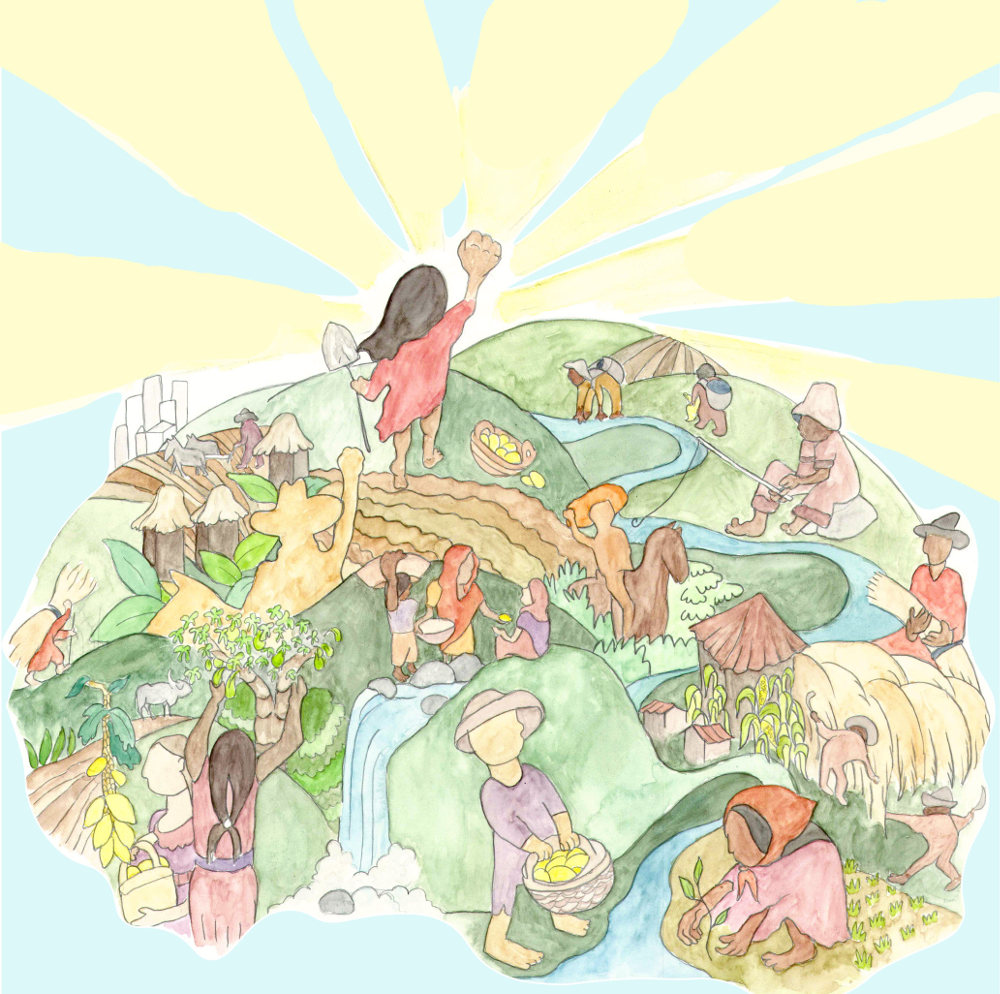
As part of the International Day of Action Against WTO and Free Trade Agreements, members and allies of La Via Campesina and its allies organised several demonstrations, seminars and media releases in September and October, to highlight their concerns regarding several multilateral, regional and bilateral trade agreements that are currently being negotiated inside and outside the WTO.
10 September of every year is a day to commemorate the sacrifice of South Korean peasant Lee Kyung Hae outside the gates of WTO’s Ministerial meeting venue in Cancun, Mexico in 2003. It is also a time when several members of La Via Campesina carry out coordinated actions to highlight their continued struggles against neoliberalism, deregulation and opening of the peasant economies to global free trade system.
This year, from Americas to the far east corners of the Asian continent several actions took place. Here are the highlights:
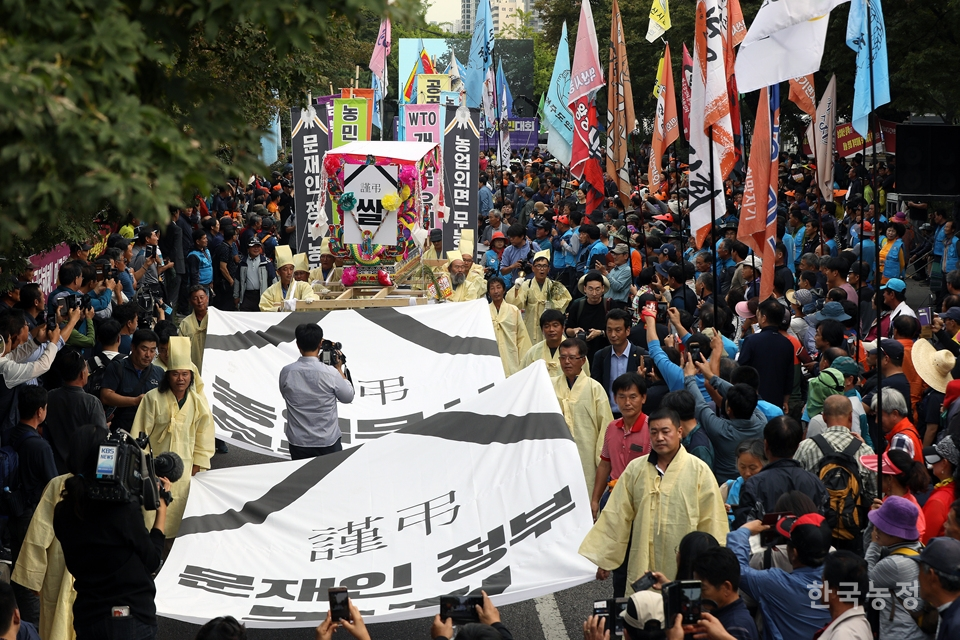
In South Korea, the peasant movements released a statement condemning the attempts to strip their country’s ‘Developing Nation Status’ inside the WTO, which they warned will have devastating consequences for peasant families who depend on agriculture for their livelihoods. The statement echoed fears around reducing the import tariff on rice, which can further plunge the peasants into a deeper crisis. You can read the full statement here. On the 25th of September, over 25,000 peasants in the country took the streets of Yeouido in Soeul condemning Korean government’s indifference to agriculture and peasant issues. More on that here.
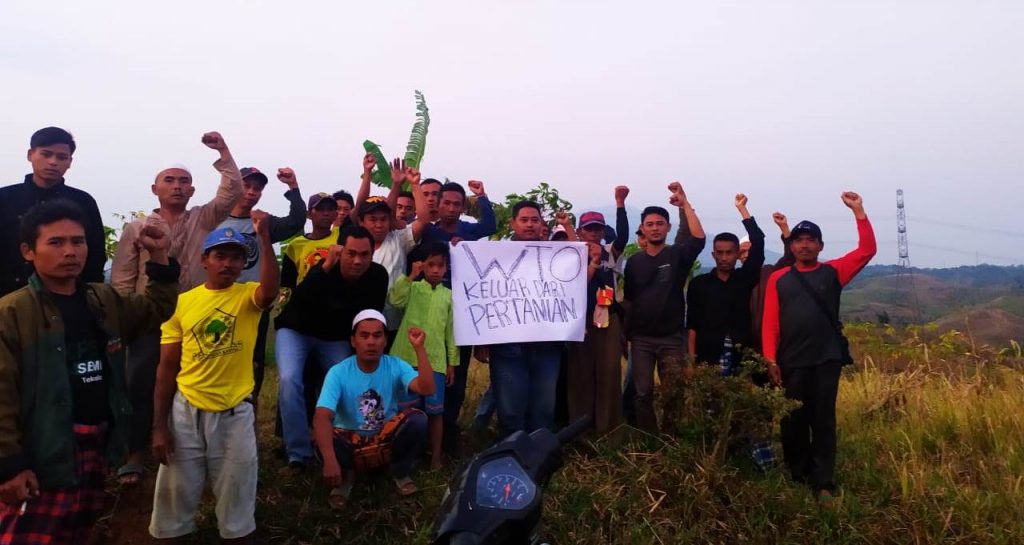
In Indonesia, young peasants of Serikat Petani Indonesia organised demonstrations and coodinated video messages that called out WTO’s continued interfernce in the agricultural policies of the country. In a press statement released to mark the Global Action Day, SPI rued that several efforts of the Indonesian government to bring in agrarian reform is being challenged and bolced by a host of free trade agreements. “The WTO coerces the Indonesian government to amend regulations in the agriculture and food sectors that are deemed incompatible with the free trade regime and the interests of industrialized countries.”, said Henry Saragih the chairperson of the peasants union. Young members of the union also mobilised college students in several actions that took place across the country against WTO.

In Belgium, hundreds of farmers converged on tractors in Ciney to protest against free trade agreements. Gathered in 600 tractors, the farmers poured a small quantity of milk in front of the replica of a cow painted with the colors of the European Union, symbolizing the destruction of the Belgian dairy sector by the CETA , Mercosur and other agreements. Watch the video of the action here
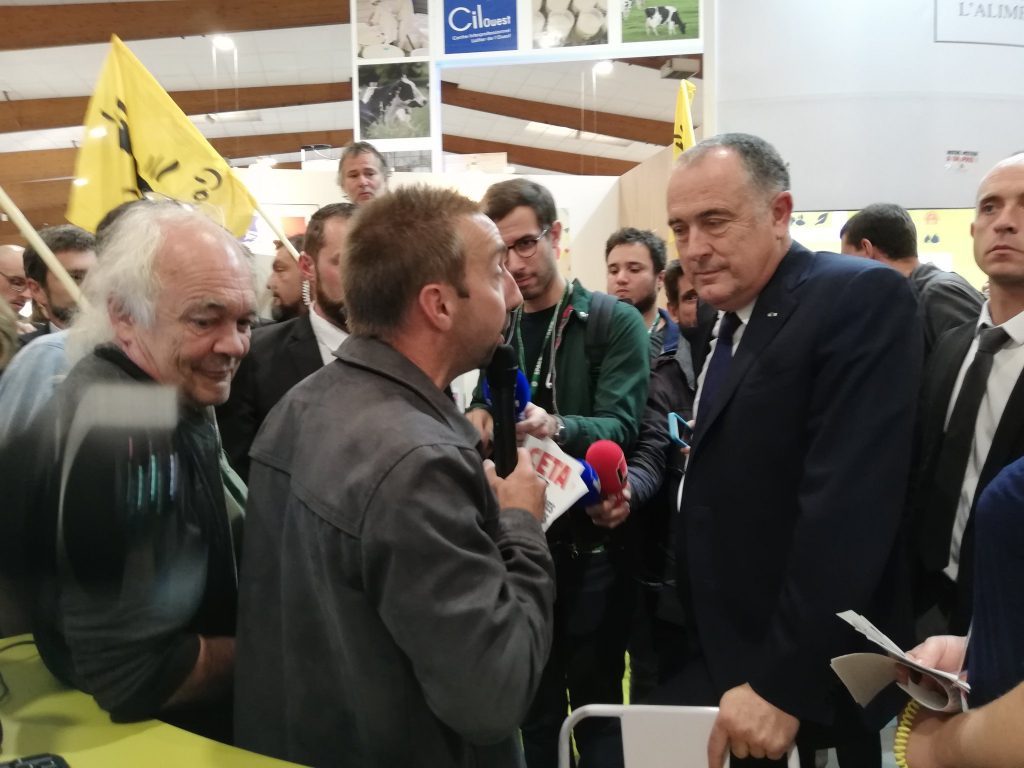
In France, peasants organsied by Confederation Paysanne demonstrated at the stand of the Ministry of Agriculture during the opening of the SPACE de Rennes. They called upon the Minister for Agriculture to demand the rejection of CETA and to reaffirm its opposition to all Free Trade Agreements (FTAs). “Indeed, these FTAs lead to a race to the bottom with regard to the price of the produce. The disappearance of customs duties, covered by these agreements, definitely prevents any setting of remunerative prices for farmers, here and elsewhere.”, a statement by the movement read.
In the Americas too several actions took place. A massive mobilisation took place in Chile against TPP11. Since the treaty negotiations began in 2012, social movements in Chile have been sending warning signals. Organised under the banner “Better without TPP” the demonstrators called out TPP11 for crystallizing corporate privileges and foreign investors rights, while neglecting workers and peasants.
In an interview given to Radio Mundo Real, Edgardo García, general secretary of the Association of Farm Workers (ATC) of Nicaragua and coordinator of the CLOC-LVC in Central America interpreted WTO’s neo-liberal free trade push as a war against the people in his region. He called out the Free Trade Agreements as tool for wealthier nations to capture markets in economically poorer regions, by offering heavy subsidies to home grown agrobusinesses who then invade and decimate the local economies and peasant markets.
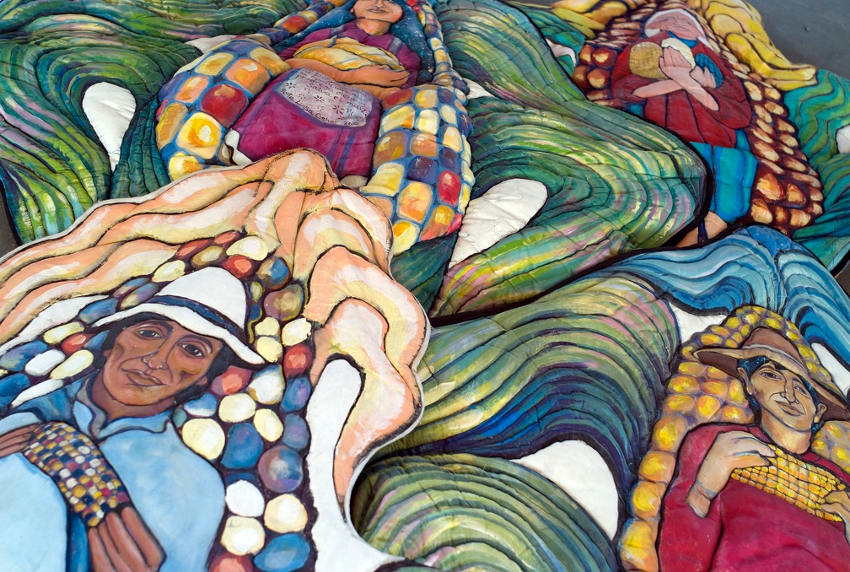
In North America, members of La Via Campesina pointed out that numerous sections of the [US-Mexico-Canada] agreement propose trade policy changes that will worsen the social, economic, and environmental crises facing rural communities across North America. Many of problem areas in the agreement include: the privileging of corporate interests over those of laborers and family farmers; the focused attempt to attack Mexico’s ability to protect its seeds; the efforts to undermine Canada’s public policy supports for small scale agriculture; and the lack of recognition for Indigenous people’s claims to territory. Read the full statement here.
In South Asia, Bangladesh Agricultural Farm Labourers Union mobilised workers in Gazipur to hold a demonstration against WTO and FTAs and to call upon the government to implement the UN Declaration on Rights of Peasants and Other People Working in Rural Areas through progressive agricultural policies.
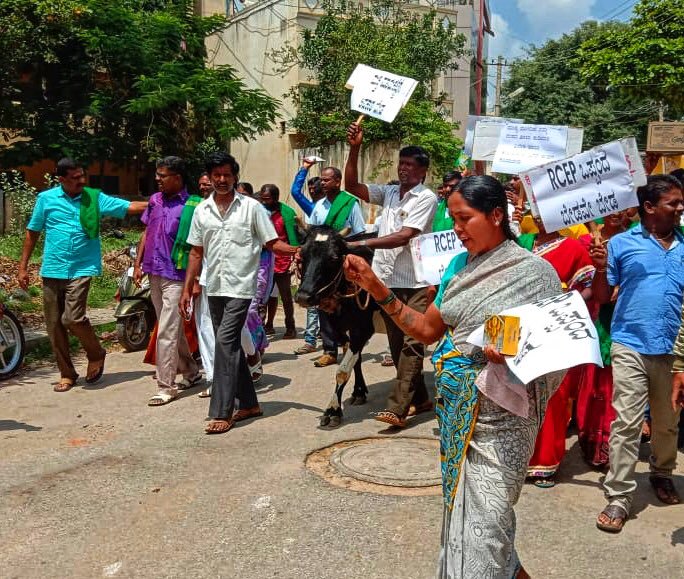
In India, all the prominent peasant unions, many of them also members of La Via Campesina shot out a letter to the Indian Government citing complete lack of transparency while negotiating the Regional Comprehensive Economic Partnership Agreement(RCEP) involving ASEAN Nations, China, India and Asia Pacific. They warned that RCEP, considered the largest free trade agreement by many for the sheer volume of population it will impact upon, will destroy the country’s dairy economy as well put the peasant seed system under strain. “We have an impressive network of individual sellers, cooperatives, others who have made our country self-sufficient in milk. It’s an excellent model that should be replicated in other developing countries.”, said Kannaiyan who is the general secretary of SICCFM in India and also an active organiser in the movement. He shares the concern of 75 million Indian households that depend on the local dairy economy with regard to RCEP, which threatens to open it up to dairy imports from New Zealand and Australia.
The Free trade adherents tend to spin these realities as the growing pains of a world becoming more prosperous as a whole, but farmers in the developing world tell a different story. “For the economic benefit of some large corporations… Korea’s agricultural base has completely collapsed,” said Jeongyeol Kim, a leader within the Korean Women Peasant Association in South Korea and a member of La Via Campesina in an interview to VICE. “Sixteen years later [since Lee’s death], the economic gap between urban and rural areas has widened significantly, and because of the neoliberal agricultural system, income gaps in rural areas are increasing and rural communities are collapsing”.
Despite all of these setbacks, peasants and farmers have scored some victories in recent years. In 2018, for example, the United Nations passed the UN Declaration on the Rights of Peasants and Other People Working in Rural Areas, which began as a proposal put forwarded by La Via Campesina and its allies.
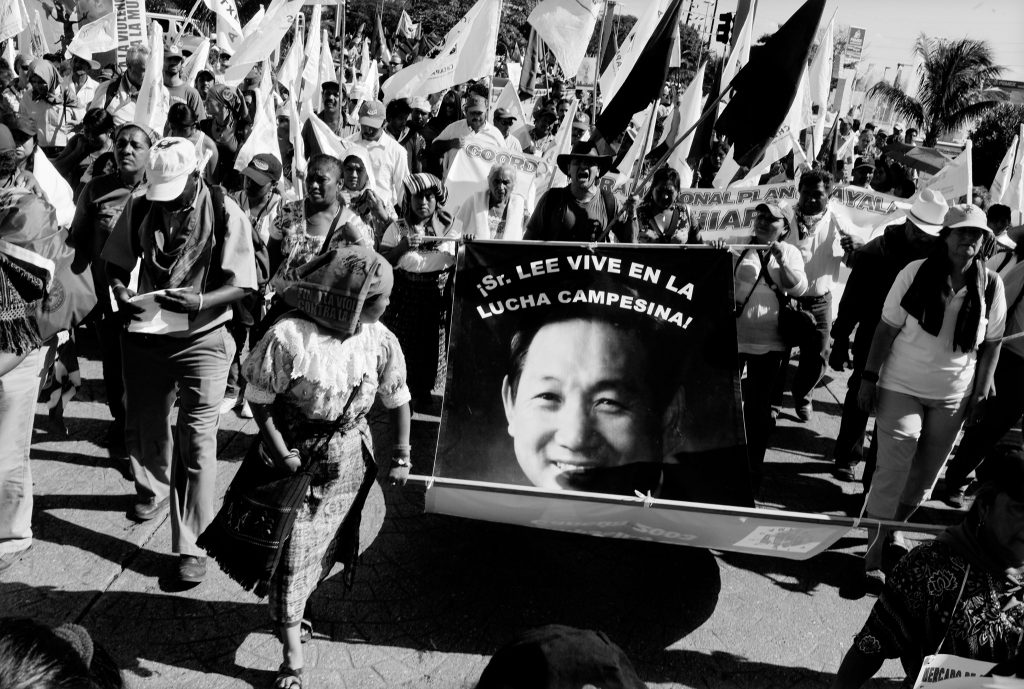
For Carlos Marentes, who was at the protests in Cancún when Lee killed himself, these renewed debates and the UN declaration are an indication that “the spirit of Mr. Lee lives on” as peasants continue to fight for their rights. “The self-sacrifice of Mr. Lee called the attention of the world to the plight of farmers,” Manteres said. “Now, you can say in a way that the self-sacrifice of Mr. Lee was not in vain.”
